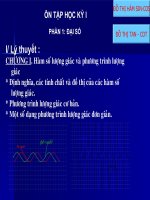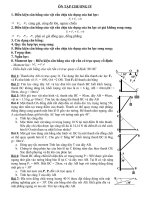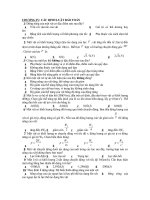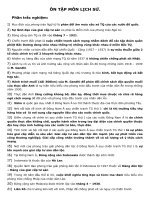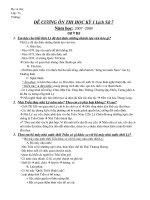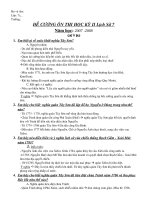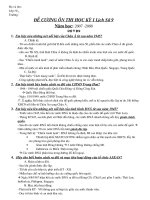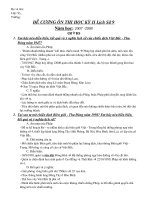Ôn tập Unit 4,5,6 Eng 11 - P2
Bạn đang xem bản rút gọn của tài liệu. Xem và tải ngay bản đầy đủ của tài liệu tại đây (199.72 KB, 6 trang )
REVIEW 2
Name : ………………………………………………… - Class : …………….
A. VOCABULARY
I. Unit 4 : VOLUNTEER WORK
(the) aged (n) ['eidʒd] người già
assistance (n) [ə'sistəns]sự giúp đỡ
be fired (v) ['faiəd]bị phạt
behave (v) [bi'heiv]cư xử
bend (v) [bend]uốn cong, cúi xuống
care (n) [keə]sự chăm sóc
charity (n) ['t∫æriti]tổ chức từ thiện
comfort (n) ['kʌmfət]sự an ủi
co-operate (v) [kou'ɔpəreit]hợp tác
co-ordinate (v) [kou'ɔ:dineit]phối hợp
cross (v) [krɔs]băng qua
deny (v) [di'nai] từ chối
desert (v) [di'zə:t]bỏ đi
desert (n) ['dezət] sa mạc
diary (n) ['daiəri]nhật ký
direct (v) [di'rekt; dai'rekt] điều khiển
disadvantaged (a) [,disəd'vɑ:ntidʒd]bất hạnh
donate (v) [dou'neit]tặng
donation (n) [dou'nei∫n] khoản tặng/đóng góp
donor (n) ['dounə]người cho/tặng
fire extinguisher (n) ['faiəriks'tiηgwi∫ə]bình chữa
cháy
fund-raising (a) [fʌnd'reiziη]gây quỹ
gratitude (n) ['grætitju:d]lòng biết ơn
handicapped (a) ['hændikæpt] tật nguyền
instruction (n) [in'strʌk∫n]chỉ dẫn, hướng dẫn
intersections (n) [,intə'sek∫n]giao lộ
lawn (n) [lɔ:n]bãi cỏ
martyr (n) ['mɑ:tə]liệt sỹ
mountain (n) ['mauntin]núi
mow (v) [mou] cắt
natural disaster (n) ['næt∫rəl di'zɑ:stə]thiên tai
order (n) ['ɔ:də]mệnh lệnh
order (v) ra lệnh
orphanage (n) ['ɔ:fənidʒ] trại mồ côi
overcome (v) [,ouvə'kʌm]vượt qua
park (v) [pɑ:k]đậu xe
participate in (v) [pɑ:'tisipeit]tham gia
take part in (v) tham gia
raise money (v) quyên góp tiền
receipt (n) [ri'si:t] giấy biên nhận
remote (a) [ri'mout]xa xôi, hẻo lánh
retire (v) [ri'taiə]về hưu
rope (n) [roup]dây thừng
snatch up (v) ['snæt∫] nắm lấy
suffer (v) ['sʌfə]chịu đựng, đau khổ
support (v) [sə'pɔ:t]ủng hộ, hỗ trợ
tie … to …(v) [tai]buộc, cột … vào …
toe (n) [tou]ngón chân
touch (v) [tʌt∫]chạm
voluntarily (adv) [vɔlənt(ə)rili]1 cách tình nguyện
voluntary (a) ['vɔləntri]tình nguyện
volunteer (n) [,vɔlən'tiə]tình nguyện viên
volunteer (v) tình nguyện, xung phong
war invalid (n) [wɔ:'invəli:d]thương binh
II. Unit 5 : ILLITERACY
academic (a) [,ækə'demik]có tính học thuật
campaign (n) [kæm'pein]chiến dịch
cheat (v) [t∫i:t]gian lận
consult (v) [kən'sʌlt] hỏi ý kiến
decline (v) [di'klain] suy giảm
decrease (v) ['di:kri:s]giảm
effective (a) [i'fektiv] hiệu quả
encourage (v) [in'kʌridʒ]khuyến khích
enforce (v) [in'fɔ:s]bắt tuân theo
eradicate (v) [i'rædikeit]xóa bỏ
ethnic minority (n) ['eθnik mai'nɔriti]dân tộc thiểu số
fight (against) (n) [fait ə'geinst]cuộc chiến, chống lại
goal (n) mục tiêu, mục đích
highlands (n) ['hailænd]cao nguyên
honorable (a) ['ɔnərəbl]vinh dự
illiteracy (n) [i'litərəsi] mù chữ
lifeguard (n) ['laifgɑ:d]người cứu đắm
literate (a) ['litərit]biết đọc, viết
low-income (a) [lou 'iηkʌm]thu nhập thấp
maturity (n) [mə'tjuəriti]sự trưởng thành
mature (a) [mə'tjuə] chin, sung mãn, trưỡng thành
motivate (v) ['moutiveit]thúc đẩy
performance (n) [pə'fɔ:məns]sự thể hiện, thành tích
promotion (n) [prə'mou∫n]khuyến khích
rate (n) [reit]tỉ lệ
realistic (a) [riə'listik] thực tế
reduce (v) [ri'dju:s]làm giảm
regulation (n) [,regju'lei∫n]qui định
1
relevant (a) ['relvnt]liờn quan
rise (n) [raiz]s gia tng
self-respect (n) [,self ri'spekt] lũng t trng
shore (n) [:] b
shortage (n) [':tid]s thiu ht
society (n) [s'saiti]xó hi
strategy (n) ['strổtdi]chin lc
strength (n) ['stre]im mnh
strict (a) [strikt]nghiờm khc
survey (n) ['s:vei] cuc kho sỏt
tutoring (a) ['tju:trin]ph o
universalisation (n) [,ju:ni'v:slaizein]ph cp
weakness (n) ['wi:knis]im yu
III. Unit 6 : COMPETITIONS
accuse (of) (v) ['kju:z]buc ti
admit (v) [d'mit]tha nhn, thỳ nhn
announce (v) ['nauns]cụng b
annual (a) ['ổnjul] hng nm
apologise (for) (v) ['pldaiz] xin li
athletic (a) (thuc) [ổ'letik]in kinh
champion (n) ['tổmpjn]nh vụ ch
championship (n) ['tổmpjnip]
clock (v) [klk] t, ghi c (thi gian)
compete (v) [km'pi:t]thi u
competition (n) [,kmpi'tin]cuc thi u
congratulate (on)(v) [kn'grổtjuleit]chỳc mng
congratulations! [kn,grổtju'lein]xin chỳc mng
contest (n) [kn'test]cuc thi u
creative (a) [kri:'eitiv] sỏng to
detective (n) [di'tektiv]thỏm t
entry procedure (n) ['entri pr'si:d]th tc ng ký
feel like (v) mun
find out (v) tỡm ra
general knowledge quiz (n) cuc thi kin thc ph
thụng
insist (on) (v) [in'sist]khng khng ũi
judge (n) ['dd]giỏm kho
native speaker (n) ngi bn x
observe (v) ['bz:v]quan sỏt
participant (n) [p:'tisipnt]ngi tham gia
patter (v) ['pổt]ri lp p
pay (v) [pei]tr tin
poem (n) ['pouim]bi th
poetry (n) ['pouitri] th ca
prevent (from) (v) ngn nga, cn
race (n) [reis]cuc ua
recite (v) [ri'sait]ngõm, c (th)
representative (n) [,repri'zenttiv]i din
score (v) [sk:] tớnh im
smoothly (adv) ['smu:li] suụng s
spirit (n) tinh thn, khớ th
sponsor (v) ['spns] ti tr
stimulate (v) ['stimjuleit]khuyn khớch
thank (for) (v) cm n
twinkle (n) ['twikl]cỏi nhỏy mt
warn (against) (v) cnh bỏo
windowpane (n) ['windou'pein]ụ ca kớnh
B. GRAMMAR
I. Gerund and Present Participle
1. Gerund (Danh động từ) : đợc cấu tạo bởi một động từ + ING để trở thành danh từ.
Gerund có chức năng làm chủ ngữ trong câu.
Ex: Swimming in a swimming pool on a hot day is very interesting.
Gerund có chức năng làm tân ngữ trong câu.
Ex: He likes playing football.
Gerund có chức năng làm bổ ngữ trong câu.
Ex: Conservation is safeguarding and preservation of natural resources.
Cũng nh những danh từ khác, Gerund cũng đợc dùng sau một mạo từ, tính từ sở hữu,
Ex: Do you mind opening the door?
The reclaiming is important for farmers.
Thank you for your coming.
Gerund đôi khi để thành lập danh từ kép.
Gerund + Noun :
Ex : cooking-oil, sleeping-pill, adding-machine,
Noun + Gerund :
Ex : child-reaing, town-planning,
2. Present Participle( Hiờn tai phõn t) : đợc cấu tạo bởi một động từ + ING
a , Cac cach dung thụng thng :
2
Present participle (V-ing) đi sau đông từ TO BE để diễn tả hành động đang xảy ra.
Ex: I am studying English now.
Present Participle ( V-ing) đợc dùng thay thế một mệnh đề quan hệ.
Ex: The train arriving at the station is one hour late. ( The train which is arriving at the station is one hour late.)
Present Participle ( V-ing) dùng để miêu tả hai hành động.
xảy ra cùng một thời điểm, một chủ ngữ.
Ex: We sat in front of T.V, watching football.
xảy ra nối tiếp nhau, cùng chung một chủ ngữ
Ex: Closing all the windows and the door carefully, she went to bed. Expression of place (cum t chi ni chụn)
Present participle ( V- ing) cũng đợc dùng nh một tính từ .
Ex: boiling water, a boring story, exciting city,
b, Mụt sụ cõu truc liờn quan : V + (O) + Present participle
V + Present participle : SIT, STAND, LIE, COME, RUN , BE BUSY,
Ex : He sat starting at the photo of his father.
People ran screaming for help.
V + O + Present participle :
SIT, STAND, LIE + Expression of place (cum t chi ni chụn) + Present participle
Ex : He sat on the chair reading a newspaper.
She stood at the door waiting for her child.
SPEND, WASTE + Expression of time / money + Present participle
Ex : He spent all the money buying books.
Most students wasted the time playing computer games.
Verbs of perception (ng t nhn thc) + O + Present participle : SEE, HEAR, FEEL, NOTICE,
WATCH,
Ex: We heard someone talking in the room.
I see him passing my house everyday.
CATCH, FIND, KEEP, LEAVE + O + Present participle
Ex: The detective caught him stealing the watch.
He found a tree lying across the road.
I left her talking to my mother.
HAVE + O + Present participle
Ex: I had him cleaning his bike.
THERE BE + NOUN + Present participle
Ex: Theres a man standing outside the room
II. Perfect gerund and Perfect Participle.
Form : Danh ụng t hoan thanh va phõn t hoan thanh co dang giụng nhau : HAVING + V3.
Use : Danh ụng t hoan thanh va phõn t hoan thanh c dung diờn ta hanh ụng xay ra trc mụt hanh ụng
khac trong qua kh.
1. Perfect gerund (Danh ụng t hoan thanh):
ợc dùng thay cho dạng hiên tại của danh động từ khi chúng ta đề cập tới hành động quá khứ.
Ex: The boy was accused of having stolen/ stealing her money.
She apologized for having broken / breaking my vase.
Perfect gerund thờng dùng sau DENY
Ex: He denied having stolen her money.
2. Perfect Participle ( Phân từ hoan thanh) : dùng để nhấn mạnh hành động đã xảy ra hoàn tât trớc một hành
động khác xảy ra trong quá khứ.
Ex: Having finished all my exercises, I went to bed.
III. REPORTED SPEECH (Cõu tng thut)
Cõu giỏn tip l cõu dựng thut li ni dung ca li núi trc tip.
a. Nu ng t ca mnh tng thut dựng thỡ hin ti thỡ khi i sang cõu giỏn tip ta ch i ngụi; khụng
i thỡ ca ng t v trng t.
Ex: She says: I am a teacher.
3
She says that she is a teacher.
Ex: “I am writing a letter now” Tom says.
Tom says that he is writing a letter now.
b. Nếu động từ của mệnh đề tường thuật dùng ở thì quá khứ thì khi chuyển sang câu gián tiếp ta đổi ngôi, thì
của động từ, trạng từ chỉ thời gian và nơi chốn.
1. Thay đổi ngôi (Đại từ nhân xưng, Đại từ sở hữu và Tính từ sở hữu)
a. Ngôi thứ nhất: dựa vào chủ từ của mệnh đề tường thuật; thường đổi sang ngôi thứ ba
I → He / She me → him / her my → his / her
We → They us → them our → their
Ex: He said: “I learned English.”
He said that English.
Ex: She said to me, “My mother gives me a present.”
She told me that
b. Ngôi thứ hai: (You, your)
- Xét ý nghĩa của câu và đổi cho phù hợp, thường đổi dựa vào túc từ của mệnh đề tường thuật
Ex: Mary said: “You are late again.”
Mary said that you were late again.
Ex: “I will meet you at the airport”, he said to me.
He told me that
c. Ngôi thứ ba (He / She / Him / Her / His / They / Them / Their): giữ nguyên, không đổi
2. Thay đổi về thì trong câu:
DIRECT INDIRECT
Simple present - V1 /Vs(es)
Present progressive – am / is / are + V-ing
Present perfect – have / has + P.P
Present perfect progressive – have / has been +V-ing
Simple past – V2 / -ed
Past progressive – was / were + V-ing
Simple future – will + V1
Future progressive will be + V-ing
Simple past – V2 / V-ed
Past progressive – was / were + V-ing
Past perfect – had + P.P
Past perfect progressive - had been + V-ing
Past perfect – had + P.P
Past perfect progressive – had been +V-ing
Future in the past - would + V1
Future progressive in the past - would be + V-ing
3. Thay đổi các trạng từ chỉ thời gian và nơi chốn:
DIRECT INDIRECT
Now
Here
This
These
Today
Yesterday
Last year
Tonight
Tomorrow
Next month
Ago
Then
There
That
Those
That day
The day before / the previous day
The year before / the previous year
That night
The following day / the next day
The following month / the next month
Before
CÁC THAY ĐỔI CỤ THỂ CHO TỪNG LOẠI CÂU TRONG LỜI NÓI GIÁN TIẾP
1. COMMANDS / REQUESTS (Câu mệnh lệnh, câu đề nghị)
- Mệnh lệnh khẳng định:
Direct: S + V + O: “V1 + O …”
Indirect: S + asked / told + O + to + V1 + ….
Ex: He said to her: “Keep silent, please.” → He told her
“Wash your hands before having dinner, Lan.” The mother said.
→ The mother told Lan
- Mệnh lệnh phủ định:
4
Direct: S + V + O: “Don’t + V1 + …”
Indirect: S + asked / told + O + not + to+ V1 ….
Ex: “Don’t forget to phone me this afternoon,” he said.
→ He reminded me
The teacher said to the students: “Don’t talk in the class.”
→ The teacher
Tùy theo ngữ cảnh trong lời nói động từ tường thuật said hoặc said to có thể đổi thành told, asked, advised,
persuaded, directed, begged, encouraged, …
Ex: The doctor said to his patient: “Do exercise regularly.”
→ The doctor
2. STATEMENT (Câu trần thuật)
Direct: S + V + (O) : “clause”
Indirect: S + told / said + (O) + (that) + clause
Note: said to → told
Ex: Tom said, “I want to visit my friend this weekend.”
→ Tom said (that)
She said to me, “I am going to Dalat next summer.”
→ She told me (that)
3. QUESTIONS (Câu hỏi)
a. Yes – No question
Direct: S + V + (O) : “Aux. V + S + V1 + O….?”
Indirect: S + asked + O + if / whether + S + V + O ….
Ex: He asked: “Have you ever been to Japan, Mary?” → He asked Mary
“Did you go out last night, Tan?” I asked → I asked Tan
b. Wh – question
Direct: S + V + (O): “Wh- + Aux. V + S + V1 + O ?”
Indirect: S + asked + O + Wh- + S + V + O.
Ex: “How long are you waiting for the bus?” he asked me.
→ He asked me
“Where did you go last night, Tom?” the mother asked.
→ The mother asked Tom
4. DANH ĐỘNG TỪ (V-ING) TRONG LỜI NÓI GIÁN TIẾP
Khi lời nói trực tiếp là lời đề nghị , chúc mừng, cảm ơn, xin lỗi, …động từ tường thuật cùng với danh động
từ (V-ing) theo sau nó thường được dùng để chuyển tải nội dung lời nói trên.
a. Reporting Verb + V-ing + ….
Deny (phủ nhận), admit (thừa nhận), suggest (đề nghị), regret (nuối tiếc), appreciate (đánh giá cao, cảm
kích)
Ex: Peter said: “I didn’t steal the painting.” → Peter denied stealing the painting.
“Why don’t we go out for a walk?” said the boy. → The boy suggested going out for a walk.
b. Reporting Verb + (Someone) + Preposition + V-ing + ….
- thank someone for (cám ơn ai về ….)
- accuse someone of (buộc tội ai về …)
- congratulate someone on (chúc mừng ai về
….)
- warn someone against (cảnh báo ai về
….)
- dream of (mơ về …)
- object to (chống đối về ….)
- apologize someone for (xin lỗi ai về …)
- insist on (khăng khăng dòi
…)
- complain about (phàn nàn về ….)
Ex: “I’m happy to know that you win the game. Congratulations!”, Jim said to Mary.
→ Jim
I said to the boy: “Don’t play ball near the restricted area.”
→ I
Daisy said: “I want to be a famous singer in the world.”
→ Daisy
Note:
1. Why don’t you / Why not / How about → suggested + (someone) + V-ing …
Ex: “Why don’t you send her some flowers?” he said.
5
→ He suggested me sending her some flowers.
2. Let’s → suggested + V-ing …
Let’s not → suggested + not + V-ing …
Ex: “Let’s meet outside the cinema,” he said.
→ He suggested meeting outside the cinema.
She said: “Let’s not talk about that problem again.”
→ She suggested not talking about that problem again.
3. Shall we / It’s a good idea → suggested + V-ing …
Ex: “It’s a good idea to go for a picnic this weekend,” she said.
→ She suggested going for a picnic that weekend.
5. ĐỘNG TỪ NGUYÊN MẪU (TO-INFINITIVE) TRONG LỜI NÓI GIÁN TIẾP
Khi lời nói gián tiếp là một lời đề nghị, mệnh lệnh, ý định, lời hứa, lời yêu cầu, …động từ tường thuật cùng
với động từ nguyên mẫu theo sau nó thường được dùng để chuyển tải nội dung lời nói này.
a. Reporting Verb + To-inf …
- agree demand (đòi hỏi) guarantee (bảo đảm)
- hope promise swear (thề)
- threaten (đe dọa) volunteer offer (đưa ra đề nghị)
- refuse consent (bằng lòng) decide
Ex: “I will give you my book if you need it,” said my friend.
→ My friend offered to give me her book if I needed it.
b. Reporting Verb + Object + To-inf …
- ask advise (khuyên) command (ra lệnh)
- expect instruct (hướng dẫn) invite (mời)
- order (ra lệnh) persuade (thuyết phục) recommend (khuyên)
- remind (nhắc nhở) encourage (cổ vũ) tell
- urge (thúc giục) warn (cảnh báo) want (muốn)
Ex: “Don’t forget to lock the door,” I said to my sister.
→ I reminded my sister to lock the door.
Ann said: “Come to my place whenever you are free.”
→ Ann invited me to come to her place whenever I was free.
Note:
1. Lời đề nghị: Would you / could you / Will you / Can you → asked + someone + to-inf
Would you mind / Do you mind + V-ing → asked + someone + to-inf
Ex: “Can you read the instructions again?” she said.
→ She asked me to read the instructions again.
He said: “Would you mind opening the door, please?”
→ He asked me to open the door.
2. Lời mời: Would you like / Will you → invited someone + to-inf
Ex: “Will you have lunch with me?” he said.
→ He invited me to have lunch with him.
3. Lời khuyên: Had better / If I were you / Why don’t you → advised someone + to-inf
Ex: “If I were you, I would phone her,” he said.
→ He advised me to phone her.
6. CÂU ĐIỀU KIỆN TRONG LỜI NÓI GIÁN TIẾP
Nếu trong lời nói trực tiếp có câu điều kiện thì chỉ có câu điều kiện loại 1 là thay đổi về thì, câu điều kiện
loại 2 và 3 vẫn giữ nguyên hình thức động từ của chúng.
Ex: “If I have time, I will visit her,” he said.
→ He said that if he had time he would visit her.
She said: “If I had enough money, I would buy a car.”
→ She said that if she had enough money she would buy a car.
He said to me : “If I had met you, I would have told you the truth.”
→ He told me that if he had met me he would have told me the truth.
6

